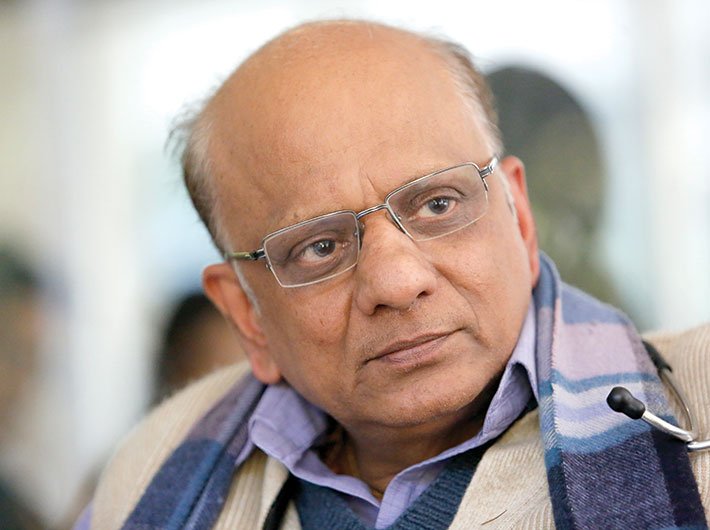A Padma Shri and former Indian Medical Association president argues for e-cigarettes and nicotine patches as a harm-reduction strategy. Time for a smoking debate
Should e-cigarettes, nicotine patches, other nicotine-replacement therapies, and heat-not-burn (HNB) tobacco products be encouraged? Are they less harmful than smoking and traditional ways of taking tobacco? The current tobacco debate, as always, is between the hard line and pragmatism. Both sides have cogent arguments in this suspicion-ridden contest, clouded by the shadow wars staged by big tobacco and pharma lobbies.
Among those in India who argue for a pragmatic approach is leading cardiologist Dr KK Aggarwal, a Padma Shri and former president of the Indian Medical Association (IMA). “If a patient tells me he smokes, I tell him he must quit. As a doctor, my ethics dictate that I do that – and I always advise young people to never consume tobacco in any form. Or get into other drug dependencies, for that matter. I also took part in the campaign for bigger pictorial warnings on cigarette packets,” he says. “But when a patient with a long history of tobacco use is unable to stop, or does not want to, what can a doctor do? A pragmatic solution is to suggest that the patient switch to less harmful ways of getting his nicotine high. Also, these aids may help him quit ultimately.”
Nicotine patches or e-cigarettes may help smokers or tobacco chewers assuage the craving. Since there’s no smoke or tar, nor any chewing, the risk of lung and oral cancer is lower. Though nicotine is highly addictive, causes hypertension, constricts and hardens arteries, and increases the heart rate and the risk of blood clotting, it’s not per se known to cause cancer.
Aware that controversy hovers over the topic, Dr Aggarwal sets down strong caveats: sale should be restricted to those above 21; some items must be available only on prescription; efforts should be redoubled to discourage tobacco use in young people; and students should be cautioned on the health risks of tobacco use and other dependencies, right at school level. Since a ban on tobacco can neither be effected nor prove effective, he says there should be enough leeway for “harm reduction”. He cites
reports from Public Health England; the US National Academy of Sciences, Engineering and Medicine; the American Cancer Society; Cancer Research UK; and the Royal College of Physicians.
“Harm reduction” is a new buzzword, but those on the other side call it a euphemism coined to ease in new fashions that benefit tobacco giants. They suspect a nascent tobacco-pharma lobby is at work: after all, the nicotine in the patches and vaping fluids comes from tobacco. Researchers at the University of California, San Francisco, say “the pharmaceuticalisation of the tobacco industry” has begun.
In the US, as across the world, the debate is polarised. On December 18, surgeon-general Jerome Adams issued a rare public health advisory calling for immediately addressing the vaping epidemic among teenagers. He warned that nicotine exposure in adolescence can harm the developing brain. Vaping fluids in kid-friendly flavours and e-cigarettes with sleek gadget appeal would hook teens and make them adult smokers. Or marijuana users, since teens start using the devices for vaping marijuana too. On the other hand, in a November 15 article in the Washington Post, Tom Miller, a former attorney-general, wrote that if smokers are denied safer alternatives because of the overreaction against e-cigarettes, the country risked losing the huge fall in smoking rates (from 24 percent to 14 percent) achieved over 20 years.
There is also the controversial case of Derek Yach, a former World Health Organisation (WHO) hand who took part in the scripting of the Framework Convention on Tobacco Control. He now heads the Foundation for a Smoke-Free World, which advocates the use of e-cigarettes, patches, etc. The foundation is promoted by Philip Morris International, a tobacco giant.
Dr Aggarwal, like Yach, is all for switch-and-quit. Even if quitting does not happen, the harm at least is reduced, he reasons. As for behavioural therapies for quitting tobacco, he says they are not practicable on a large scale in India: counselling takes months and there aren't enough counsellors.
The debate smokes. Or perhaps does the
dragon, a vaping trick of exhaling fumes through the nostrils and the corners of the mouth at the same time. It's a favourite with teenagers.
sbeaswaran@governancenow.com
(The article appears in January 15, 2019 edition. The last paragraph was modified for clarity after publication in print.)

